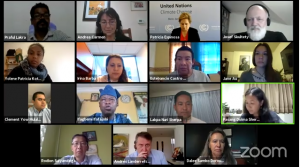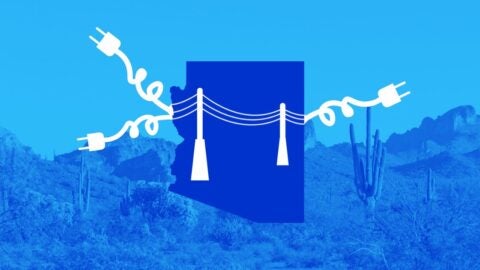Looking ahead to the 4th Local Communities and Indigenous Peoples Platform Facilitative Working Group meeting
This post was coauthored by Bärbel Henneberger.
**This is the second blog of our series exploring the challenges to effective participation of Indigenous Peoples in international climate policy forums.
The third meeting of the Facilitative Working Group (FWG), which was the first official 2020 meeting of the Local Communities and Indigenous Peoples Platform (LCIPP) of the United Nations Framework Convention on Climate Change, took place virtually between October 5 and 8.
In our previous blog, we presented an overview of the concerns raised by Estebancio Castro, Representative for the UN Indigenous Sociocultural Region: Central and South America and the Caribbean, to the UNFCCC LCIPP, on virtual meetings and the effective participation of Indigenous Peoples. His concerns were very valid, as during the recent FWG meeting, participation of Indigenous Peoples, especially from regions with unstable internet connection, was quite difficult. In this blog, we will discuss these key barriers to virtual participation, as well as cover some of the progress that the FWG was able to make, next steps, and lessons learned.

Effective participation: Virtual vs face-to-face
The short time for presentations and discussions (4 days, 3 hours per day) made it difficult to engage in deeper exchanges. Generally, some participants had poor internet connectivity that repeatedly failed throughout the meeting. Other participants were not able to participate at all because they did not have access to internet. Moreover, a stable internet connection is needed to access meeting materials prior to the start of meeting. As the FWG work gets more technical, participants need to have access to these documents, and more time to analyze them. Due in part to these issues, the FWG agreed to reschedule regional meetings of Indigenous knowledge holders until COVID-19 is under enough control to allow for face-to-face convenings, recognizing that Indigenous protocols, such as opening ceremonies and blessings by elder participants, need to be respected. Other activities, however, will continue virtually, even if this means that for some, effective participation is not guaranteed.
It is clear that, thus far, the COVID-19 pandemic has made it very challenging for the FWG to complete the tasks defined in the LCIPP’s two year work plan. Some activities have had to be postponed until face-to-face meetings are possible.
Summary of LCIPP FWG 3
Below are some of the main issues discussed during the FWG 3 meeting that we expect participants and organizers to make progress on in the upcoming FWG 4 meeting.
Despite all of the technical difficulties, participants were able to make some progress. They reviewed a presentation of advances made in developing the structure for the Dedicated LCIPP Web Portal—a resource intended to make the work of the LCIPP more widely accessible. While the structure of the Portal looks promising, it will be challenging to gather inputs due to concerns around how to gather and present Indigenous knowledge. The goal is to launch the web portal by the end of the 2020.
During the meeting, participants saw presentations about the progress made on some of the 12 official LCIPP activities of the initial two-year work plan. The official activities range from annual meetings, regional gatherings, training workshops and materials, to engagement inside and outside the UNFCCC process. Some activities were discussed more closely:
Activity 7, “Existing policies and practices for participation (under and outside the UNFCCC)”: The details of this activity are reflected in a concept note, but this document was shared only among FWG members and has not yet been shared with Parties.
However, we know participants discussed possibilities of linking work between the LCIPP and other UN agencies, especially with the Convention on Biological Diversity (CBD) Article 8(j) on traditional Knowledge, Innovations, and Practices. The Article 8(j) Working group was specifically created to provide advice on the application and the development of legal and other appropriate forms of protection for Local Communities and Indigenous Peoples knowledge, innovations and practices.
During the meeting, several participants raised concerns about representation within the FWG, which does not represent the Indigenous Peoples to the UNFCCC, but rather holds a technical mandate to conduct activities in collaboration with other international bodies to enhance the coherence and impact of the LCIPP. Many delegates stated that the International Indigenous Peoples Forum on Climate Change (IIPFCC) — the representative body of Indigenous Peoples participating in the UNFCCC, also known as Indigenous Peoples Caucus — needs to participate directly and altogether when it comes to decision making and representing Indigenous Peoples before other entities under and outside UNFCCC.
Activity 9, “Existing policies, actions and communications under the Convention”: Participants discussed gaps hindering the consideration and engagement of Indigenous Peoples and local communities in the Convention. Potential gaps identified that will be addressed in future discussions, include: insufficient capacity-building for engagement, lack of references to Indigenous technologies and practices, missing considerations of gender in relation to Indigenous Peoples and local communities in most documents, and a low level of engagement with Indigenous Peoples in general.
Activity 10, “Good practices for Indigenous Peoples’ and local communities’ participation in national climate policy”: Despite lacking a comprehensive concept note to reflect on prior to the discussion, participants reviewed submissions ranging on topics from the consideration of local communities and Indigenous Peoples in national policy frameworks and national policy-making, to the engagement between Indigenous and government parliaments. Gender considerations and better engagement of knowledge systems and practices were other topics.
Activity 11, “Existing funding within the United Nations system, and additional funding opportunities for participation of Indigenous Peoples”: Participants discussed the geographical distribution—among the different UN regions—of existing funding opportunities for the participation of local communities and Indigenous Peoples in forums related to climate change. Participants also considered the thematic distribution of existing funding opportunities, for example for capacity building, gender related topics, exchange of experiences and best practices, and youth engagement, and also identified different potential pathways to access this funding.
Article 6/mandate discussions
The FWG agrees that Article 6 of the Paris Agreement is a very important topic for the Indigenous Caucus to the UNFCCC, as the latest draft of Article 6 text reflects the fundamental rights of Indigenous Peoples, free determination, and Free Prior Informed Consent, and is broadly used as a reference for Indigenous Peoples rights in the UNFCCC discussions. However, the mandate of the LCIPP FWG to engage in Article 6 discussions still needs to be discussed. As previously mentioned, the mandate of the FWG is primarily to operationalize the Platform.
Some participants, though, believe that there could be a broader scope of advocacy work, including on Article 6, that can be fulfilled by the LCIPP due to the direct channels and extensive network it has established. But further work, especially negotiations with Parties, corresponds to the Indigenous Peoples Caucus and its representatives. Furthermore, even if the FWG were to decide to extend its mandate to participate in Article 6 discussions, in order to provide technical recommendations as an advisory body within the UNFCCC, the SBSTA co-chairs must first send an invitation to the FWG, requesting some advice on Article 6, which has not yet been done.
Next steps
The next FWG meeting of the LCIPP (FWG4 LCIPP, 4th Meeting of the Facilitative Working Group of the Local Communities and Indigenous Peoples Platform) will be held from December 14 to 17, again, virtually. As part of Activity 4, “Annual thematic training workshops,” two training webinars will be held ahead of the December meeting: “What does ethical and equitable engagement of Indigenous Knowledge in the context of climate change look like?” and “Trust and Respect: Contours of Indigenous Knowledge;” the dates are to be confirmed.
During the meeting, several Indigenous delegates also suggested that, before the next FWG meeting, Indigenous Peoples Caucus meetings should be held to discuss issues about the mandate of the FWG. The UNFCCC confirmed to facilitate those Caucus meetings but those meetings will be each 2 hours long, instead of the usual 16 hour long face to face meetings. This means participants have to make an increased effort ahead of time to prepare succinct inputs and interventions. During those Caucus meetings, solutions to ensure effective participation will be reviewed.
Outlook
Hopefully, more Indigenous Peoples delegates will be able to connect to the next FWG meeting. The additional time being scheduled for discussion should also provide more opportunities to have deeper exchanges about the tasks that the FWG must complete. It is also imperative that written inputs be prepared and submitted ahead of the upcoming meeting to ensure that all regions and countries are able to contribute. As such, the support offered by ally organizations to support Indigenous Peoples, through capacity building or direct technical support for developing these inputs, is more important than ever. As virtual meetings are most likely in the near term, the FWG, UNFCCC, and other organizers must think about innovative ways to enable the effective participation of Indigenous Peoples.
Additional material:
Download summary of presentation: https://unfccc.int/sites/default/files/resource/FWG3%20Presentation%20slides.pdf
Watch broadcast: https://www.youtube.com/playlist?list=PLBcZ22cUY9RKM9Oy9f07focGh5UATk8Nf












